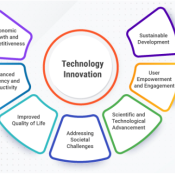

Children and Technology Navigating the Digital Landscape for Young Minds
In today's rapidly evolving digital landscape, technology plays a pivotal role in shaping the lives of individuals, especially children. The impact of technology on children has become a subject of profound concern and curiosity. This article delves deep into the various dimensions of this relationship, exploring both positive and negative effects, backed by extensive research.
The Positive Impacts of Technology on Children
Enhancing Learning Opportunities
Incorporating technology in education opens up a world of interactive learning experiences. Children and technology harmonize as educational apps, and online resources engage young minds, making learning enjoyable and effective.
Fostering Creativity and Innovation
Technology nurtures creativity among children. From digital art platforms to coding games, innovative technologies inspire kids to think outside the box, promoting creativity and problem-solving skills.
Strengthening Social Connections
Online platforms enable children to connect with peers globally, fostering friendships and cultural understanding. Social media platforms, when used responsibly, enhance communication skills and broaden social horizons.
Exploring a World of Knowledge
The internet acts as an extensive reservoir of information. The synergy between children and technology becomes evident in research endeavors. Young minds can delve into a myriad of subjects, broadening their horizons and nurturing a thirst for intellectual inquiry.
Development of Technical Skills
In an increasingly digital world, having technical proficiency is essential. Early exposure to technology equips children with valuable skills, preparing them for future academic and professional pursuits.
The Negative Impacts of Technology on Children
Sedentary Lifestyle and Health Issues
Excessive screen time often leads to a sedentary lifestyle, contributing to obesity and related health problems. Balancing screen time with physical activities is crucial for a child's overall well-being.
Negative Impact on Mental Well-being
The digital sphere can significantly worsen mental health problems among children. Instances of cyberbullying, social media pressures, and online harassment can severely dent a child's self-esteem and overall mental well-being.
Impaired Sleep Patterns
Screen time before bedtime can disrupt sleep patterns, affecting the quality and duration of rest. Sleep is essential for a child's physical and cognitive development, making this a concerning issue.
Decreased Attention Span
Constant exposure to digital devices may lead to decreased attention spans, impacting a child's ability to focus on tasks. This can hinder academic performance and overall productivity.
Conclusion
In the digital age, the relationship between children and technology is intricate, presenting both opportunities and challenges. By fostering responsible technology use, encouraging physical activities, and promoting open communication, parents and educators can guide children towards a balanced and healthy relationship with technology. Understanding the nuanced impact of technology is the first step towards empowering the younger generation for a bright and digitally literate future.
FAQs
How Does Technology Affect Children?
Technology profoundly influences children's learning, social interactions, and overall development. From enhancing education to fostering creativity, the impact of technology on children is multifaceted.
What Are 10 Negative Effects of Technology?
The negative effects of technology encompass sedentary lifestyles, mental health issues, impaired sleep, and decreased attention spans. Addressing these concerns is vital for mitigating the adverse impact on children.
What are the Benefits and Drawbacks of Technological Impact on Society?
Positive impacts include enhanced learning, improved social connections, and access to diverse information. Negative impacts range from health issues to impaired mental well-being. Balancing these aspects is key to healthy technology use.
How Does Technology Affect Kids' Mental Health?
Technology can negatively affect kids' mental health through cyberbullying, social media pressure, and excessive screen time. It is essential to educate children on responsible technology usage and provide necessary support.















